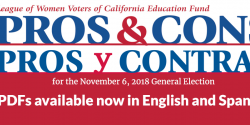Proposition 8: Regulates Amounts Outpatient Kidney Dialysis Clinics Charge for Dialysis Treatment
Should outpatient dialysis clinics be required to rebate money to private insurers if their revenue exceeds allowable costs by more than 15%?
People suffering from End Stage Renal Disease, the final stage of kidney disease, must receive dialysis to survive. Dialysis filters out waste and toxins from blood. It is typically done in a chronic dialysis clinic three times a week with each treatment lasting up to four hours each time. These clinics are licensed by the California Department of Public Health (DPH) using federal certification standards.
Approximately 588 licensed clinics operate in California. The majority of the clinics are owned and run by one of two private for-profit companies. Estimated annual revenue of the private companies is $3 billion. Most dialysis is paid for by Medicare and Medi-Cal. These programs pay a fixed rate established by the regulations and are close to the average cost of treatment. Private insurance also covers dialysis with payment rates fixed by negotiation with the providers. On average those rates are multiple times higher than that paid by the government programs.
This proposition requires the companies that own clinics to rebate certain payers, mostly private insurance companies, if the clinic chains’ corporate annual revenues are more than 15 % higher than a cap defined in the proposition. The cap is based on the total allowable costs of “direct patient services care” and “health care quality improvement costs.” The costs of non-managerial staff salary and benefits, drugs and medical supplies, staff training, patient education, and electronic health information systems fall within the cap. Certain staff such as medical directors and nurse managers are required by federal law. It is not clear if such staff falls within the allowable cost category.
Adjustments to the amount of the cap are allowed if the clinic owner operators prove to a court that the revenue cap is so low that it is an unconstitutional taking of the value of the business. The challenger bears the burden of proving what cap would be appropriate.
The fiscal impacts of this proposition are dependent upon the response of the clinics to it and on interpretations of what allowable costs are by the DPH and the courts. It appears that initially rebates will be paid which reduces the profits of the clinics. The impact on state and local governments varies from a net savings of tens of millions of dollars to a similar net cost.

